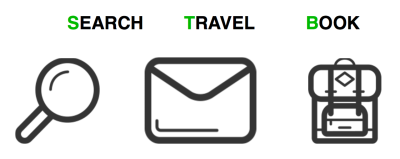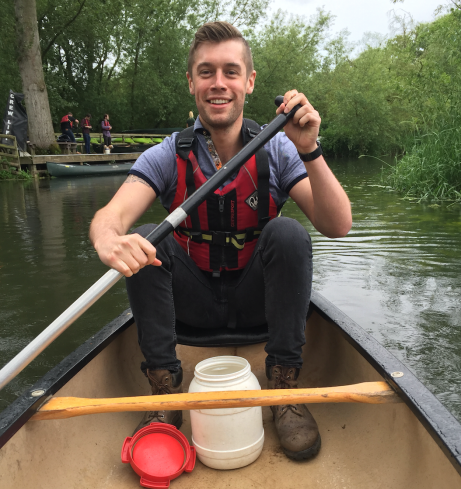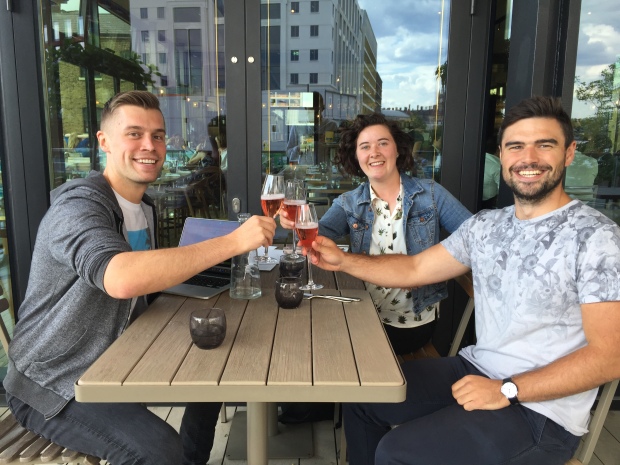Just what exactly are Ecotourism, Green Travel, Sustainable Tourism and all the names currently being thrown around in the world of travel? Seasoned travellers well read up on the subject are bound to know their green from their eco, but for the average traveller, we care about not having a negative effect on the environments we are visiting, but sometimes just don’t know where to start. Meet Max Sinclair, creator of Eco Companion – a search engine and accreditation system to find the most sustainable travel options worldwide. I sat down with him on Skype to get clued up on the subject, to vet his amazing concept and ask just how he is ensuring that all his options are truly sustainable. I hope you find it useful, as ever.
“The ultimate search engine for sustainable experiences in nature”
How it works

- You search through eco-lodges, tours, and conservation projects, ranked and sorted based on how sustainable they are.
2. Ask the questions that are important to you, and receive a personalised itinerary. Then, book your perfect experience directly a safe and secure booking engine.
3. Go out and experience all the beauty the natural world has to offer!

Meet Max! Founder of Eco Companion
What is Eco Companion and where did the idea come from?
Eco Companion is a search engine that helps you find your next sustainable holiday in nature. We use an accreditation system – named World Rating System – that looks at how well travel companies follow the principals of Eco Tourism. We ask them to fill out a questionnaire assessing their level of: cultural sustainability, economical sustainability, education (learning about nature) and how the company manages itself. These questions give them a score out of 100, and they get ranked from bronze, silver, gold – the best of which is elite green.
What that means is that if you search any destination, you would see the most sustainable experiences first: so all the way from green at top to no rating at the bottom. The positive thing about this is that it rewards people with high standards, it helps motivate the industry to be better/ improve their standards and tell us about it. Given that nature tourism takes up 20% of the tourism market, it has the potential to have a huge impact on the world. We have a similar business model to Airbnb and Trip Advisor – in that it’s the type of platform that can grow really quickly which is great.

The Eco Companion team
In terms of the idea, I started it with a university friend about 2 half years ago. I’ve always worked in travel and I went to a school called St Christophers. It’s vegetarian school with no uniforms, started by Quakers. We even had worm pits to get rid of our school waste. (I ask what a worm pit is?! Definition: boxes with worms in them). The worms recycled our waste into manure and we sold it to local farms and then give the money to charity. I’d say that back-story is what led me into this. So we got to work with a web developer, but after about a year of work they couldn’t carry on. That was a pretty low point of me trying to have a go of it by myself. But then eventually we gained an editor – my friend Taz, a new developer, new marketing manager and we now have a strong core team of 4/5 of us. Our full team is now 11/12 people working on the idea and we’ve raised £110,000 investment so far.
You mentioned the principals of Eco Tourism. Is this an abstract concept or is it something people can access?
That’s a good question. The answer is yes; it is something people can access. We have a blog post that answers just what exactly is Eco Tourism. And there is a guy named David Fennell, who is the chief of the Journal of Eco Tourism who’s basically a figurehead of the industry and has done a huge amount of work on the subject. He has a book: Eco Tourism by David Fennell, which gives you a good idea of it. There are 3 pillars of sustainability: environmental, economic and cultural. On top of that Eco Tourism has specific ones. The Global Sustainable Tourism Council (GSTC) – have their own set of internationally recognised standards and systems that we base our self on. So we’ve built an accreditation system and what the GSTC does is act as a central body that unifies these different systems and makes sure that there is conformity across them all. Eco Tourism Australia, who offered the first accreditation for Eco Tourism ever, have also helped and given feedback on our system.

Can you help demystify these different terms?
- There’s Responsible Tourism – which covers a broader spectrum, basically all well behaved tourism. Tourism doesn’t have an impact or a positive impact on the destinations it takes place in.
- Green Tourism – is like I want to reduce carbon emissions, and not leave and impact on the local area.
- Eco Tourism – has a more holistic approach. It tries to consider the culture and how it affects people living in these places. For example Magaluf – beautiful places that are now basically like England away from home – but the worst of England. Also the economical side, the fact that only around 20% of travellers’ expenditure goes towards the locals. It considers environmental factors – so applying sustainable practices so that the environment can be preserved for future generations. And also incorporating an educational element, encouraging people to respect and learn about the natural environments and local communities they visit on holiday.
Your website divides it’s search into three criteria (Eco Lodges, Eco Tours and Eco Projects), I’m going to ask you to break these down a little bit.
What is an Eco lodge?
Ultimately the hotel industry: it’s anything that involves accommodation. We’ve separated it because the types of content don’t work with the others.
Okay does that mean that the lodges get different questions than the tours for example?
Definitely, there is a unique set of questions of each one. If you’re trying to find out if a lodge is sustainable for example, you might look at: what type of toilet/ showerhead they have, or how they manage their towels. I know towels may sound like a minute thing but it’s meant of be one of the biggest impacts you can have. How you wash them, how often you change them…

What is an Eco tour?
An experience you would go on in nature, generally to more than one destination. And of course it still fits in with other factors of Eco Tourism: you experience nature, learn about nature and it should follow the principals that I mentioned earlier. You also focus on the company, for example if they have an office if London, how sustainable that is.
What is an Eco project?
Where you stay in one place and get your hands dirty. Having a positive impact on your destination in terms of the work you do, and also contributing financially to the area through your purchase of the trip.
There’s a lot of confusion/ lack of knowledge surrounding Eco Travel projects, about them not being helpful or rather than helping the local communities just existing to make money. How do you vet eco travel experiences/ accommodation on the website?
That’s a good question and I think a key thing people worry about. Green Washing is a term we use – the idea that an experience will pretend that it’s doing good and has got standards but it doesn’t. This is one of the things that has had a bad effect on the industry because there’s a lack of honesty and trust.
We vet this firstly through our world rating system. The next step is our Eco Army: which will be a member’s area for our core user group who are particularly passionate or adamant on taking Eco friendly trips. They will take a test on Eco Tourism and they can then become Eco Champions, which will allow them to then leave a review on our experiences. They can be our eyes and ears, and report truly on how sustainable something is. People can lie to us of course, but the way we confront that is as soon as we find out, we take them off the site. There are also financial incentives not to lie. I’d say the world rating system is 30% of the way there, but from that point we want to be relying on our users. Not only will we highlight good experiences but bad experiences too, so we can warn them away. We essentially want to be a place people can come to vet and find projects.

What should travellers be looking out for if they want to book Eco Travel experiences in general?
We exist to become that resource, and in the long term we will be able to provide that. But in the meantime there are the organisations I mentioned. Also, the power of Google I feel is under appreciated; just Google the hell out of it and you’ll find truth about it. Google the particular acts you’re worried about it you can get detail about what to look our for; for example if elephants are swinging left to right they’re anxious, if they have marks around their ankles they’ve recently been chained up. You can look at our blog to discover what to look out for because ultimately education is the key answer booking Eco Travel experiences.
We’ve done some really great content on the Eco Companion blog. We recently sent out a reporter to Borneo to look into this Orangutan conservation but also look into things affect them.
Max asked me if I had seen the video, which I hadn’t at the time, but now have and hugely recommend. A short but sweet 10-minute look into some of the very real factors affecting the livelihood of these stunning and playful Orangutans. Shot by an absolutely amazing camera! (I felt like I was there).
What type of Traveller are you / what do you like to do when you visit a destination?
Hmm I’d say an experiential traveller, anything that involves new experiences is something that I’m into. Iceland… places like that are pretty spectacular. Anything where I’m chasing a new experience and seeing different angles on the world that travel allows you to. I also personally think that the natural world in particular can deliver the most impactful experiences.
The last trip I did was an all-inclusive Safari; I stayed at Vuyani lodge in South Africa (on Eco Companion: The Vuyani Safari Lodge). I saw lions and African elephants wandering around and bumping into our car, those are things you don’t get to see in everyday life.
It’s funny because people always assume I get to go away to so many places, but I’ve really been just focusing on Eco Companion. But now finally I have some trips coming up! I’m really looking forward to it.
Tell me more; are they available on Eco Companion?
- Yes definitely. There’s this really cool Glamping experience in Wales: https://www.ecocompanion.com/search/eco-retreats-yurts-and-tipis
- There’s also an experience in Capri, Greece in mountains, which is just stunning – https://www.ecocompanion.com/search/kapari-natural-resort
- And then Sweden for a wilderness adventure (with Wild Sweden)! They might be my favourite operator currently; they just have such cool trips! I’m not sure if I should say that but look – I’ll show you:
- https://www.ecocompanion.com/wildsweden/kolarbyn-ecolodge-wildlife-adventure
Favourite websites/ apps for travel?
- Skyscanner does an amazing job. It is a very powerful tool and is a great starting point to booking travel – it’s always at the top of my list.
- Trip Advisor – I know people almost think it’s not cool anymore, but it did deliver this amazing impact that simply wasn’t around before. You could say now they’re getting too massive, but I would say it still allows you to quickly decide if a hotel is really delivering what they say they are. It’s a powerful tool for a general traveller.
- Airbnb is a favourite, and a company we’ve taken so much inspiration from. It’s very simply designed, allows people to stay in local areas. You do have to face to fact that you might end up somewhere random. I remember staying at this place in Stockholm that was being rented out as this older couple went out to live in the countryside during the summer months. When we arrived he gave us tonnes of freshly baked bread as his wife was a baker, VIP tickets to this club through his daughter – that was all pretty impressive. You can’t argue what its delivered in terms of experience.
Most practical travel item?
My general approach is go ultra minimal – I turn up with a backpack and a couple of changes of clothes, to make it light as possible. But I guess it would be:
- My Timberland boots
- My Backpack – which is very un-fancy – but it’s one for a laptop too so its protective (Max has a Herschel backpack).

What does the future hold for Eco Companion?
The magnitude of how big the idea can be is vast. With 20% of total tourism being nature and the tourism market being one of the biggest in the entire world. If we can build this community the impact we can create is vast. And the bigger we get the more ambitious we can be. For example flights is a tough thing we want to confront.
We talk about our business as a mission towards true sustainability, so nature tourism as an industry isn’t there yet and flights is of course the biggest Achilles heel of tourism with the emissions it produces. So to innovate within that area when we have some more weight behind us, that’s a huge dream for the future that we can do for the world, albeit a tough one. But as Facebook aims to bring Internet to the ends of the world with solar powered planes or Elon Musk starts work on his own electric planes – this is our own personal (very long term) aspirations.
In short we want to save nature, by selling nature. And be large enough to be a positive lobbying force to push governments to go in the right direction as an anti to the oil money that can create such a block on progress. We’d like to get the point where we can have influence and say to the UK government for example nature does actually matter and you, should choose to protect it.
Let me know about your sustainable travel experiences and learn more about Eco Companion by clicking below.


Very informative post! And I loved the video, though it’s sad what’s happening all around to these natural environments. Thanks for sharing
LikeLiked by 1 person
Thank you for reading! And I’m glad you enjoyed. I really enjoyed learning more about it, but like you the video made me sad, such beautiful animals… thank you for commenting though, have a great day!
LikeLiked by 1 person